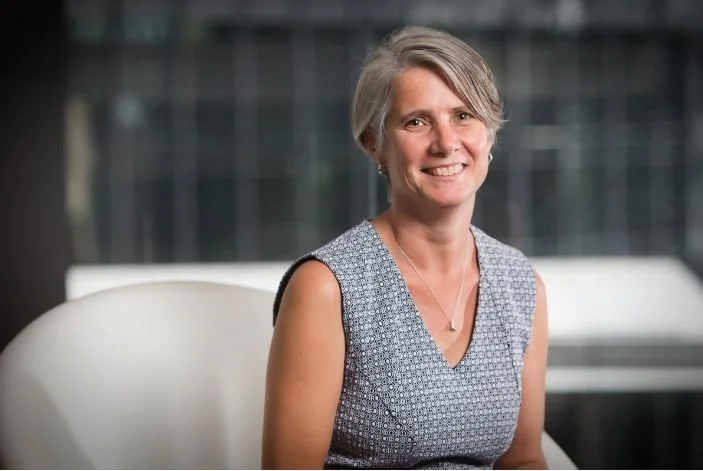A community response to suicide
Image: UNE Professor in Social Work, Myfanwy Maple.
More holistic suicide prevention could include support offered through community outlets like banks, men's sheds, hairdressers and beauty salons, according to an expert University of New England (UNE) team.
In a ground-breaking report to the Prime Minister's first National Suicide Prevention Advisor, released yesterday, UNE Professor in Social Work Myfanwy Maple and her fellow researchers have highlighted major shortfalls in existing health-care provision and the importance of future policy being informed by lived experiences of suicide.
The team's report gives voice - for the first time at this national level - to those who have attempted suicide, cared for someone who is suicidal or been bereaved by suicide. Professor Maple said its findings advocate a "seismic shift" in how we discuss suicide in Australia.
"I hope our report, coupled with the others commissioned by National Suicide Prevention Advisor Christine Morgan for the Compassion First report, bring about genuine change and illustrate more effective ways to help people," Professor Maple said. "We have identified significant gaps in health and social care services and a profound lack of appreciation for the complex reasons that bring an individual to suicide crisis."
When people fall through these gaps, it often results in additional traumas, and this is life-threatening, the report warns. "Compassionate care, focused on the individual and their needs at the time they present, is rarely provided," the report says. "Many health professionals are poorly trained in relation to suicide and are focused only on risk assessment within systems that are over-burdened."
Moving from crisis and risk management to more holistic, compassionate care would recognise that, for many people, suicide is not an isolated event but part of significant changes in personal circumstances, and often a lifetime of trauma, disadvantage, mental ill-health and inequity.
Sadly, many felt "stigmatised, disempowered and often unheard" during their encounters with public health systems, compounding their trauma. "This trauma further stigmatised their serious health issue ... cultivating distrust of the system and health professionals, and sometimes discouraging people to seek help again," the report found.
Professor Maple said the team analysed the results of an online survey of more than 1600 people with a lived experience of suicide; data from the Lifeline Eclipse Group for suicide attempt survivors; and media reports of suicide. Consistently, suicide survivors and others touched by suicide identified the importance of familiar, trusting, empathic relationships as they navigate life's challenges.
This has led Professor Maple's team to make a novel recommendation. "We would like to see a move from medically trained health professionals being the only ones able to refer someone thinking of suicide to Medicare-supplemented therapeutic services," she said. "It might be someone who provides informal, non-clinical care or intervention well outside the mental health system, like a bank manager, youth worker, work colleague, hairdresser, beautician or aged care worker."
Such a suicide prevention strategy recognises that challenges frequently arise in childhood or adolescence and can last a lifetime. "Suicide can become a lifelong companion for some people," Professor Maple said. "We need to train community members so they can potentially identify people in need early in their struggles, reach out to them and listen in a kind and compassionate manner. Suicide is a shared, community responsibility and it's incumbent on us all to work out how we can have these dangerous and difficult conversations, and in a way that alleviates distress and legitimises trauma.
"Instead of health professionals being positioned as the experts, we need to listen to and learn from those who have direct experience of suicide, to hear what helped them and boosted their resilience. This is critical in the current context of recession and financial hardship after years of drought and bushfires and the added pressures of the ongoing pandemic."
Professor Maple said the team's research identified the following major barriers to a suicidal person seeking help: a lack of accessible and affordable health services; financial distress; job loss and unemployment; and class differences between service providers and services users. Other factors contributing to suicide included a lack of treatment for complex mental health issues; limited access to support in rural and regional areas, undiagnosed and misdiagnosed mental illness; and inter-generational trauma. The findings suggest that addressing service barriers in rural communities, especially, requires a community-driven, locally sensitive approach.
Nationally, the way we talk publicly (through the media) and via social media (through podcasts, Twitter comments and Facebook posts) about suicide needs to be revisited. "Public discussions about suicide rarely describe the complexity and compounding traumas," Professor Maple said. "This can lead to bubbling anger within individuals who feel that clinical services and service providers do not understand their experience. Unless we have been in that dark, hollow, very lonely place, I don't think we can ever understand it, so we need to listen to the people who have.
"That's the real challenge now - whether it's a one-on-one conversation or a national conversation. When people are supported and able to talk openly in a safe environment about living with being suicidal, they can start to feel included and valued. With the right sort of compassionate care, suicide is largely preventable. The effectiveness of the services we fund needs to be measured against such outcomes."
While it is still too early to determine whether the pandemic will lead to a higher rate of suicide deaths, Professor Maple said the data is already showing increased distress and anxiety in society, with more mental health presentations being recorded across jurisdictions.
Christine Morgan's interim report is now available for public comment and feedback is invited. To make a submission, go to https://www1.health.gov.au/internet/main/publishing.nsf/Content/mental-national-suicide-prevention-adviser .
If this story has raised issues for you or you are concerned about someone else, please phone Lifeline on 13 11 14 or Beyond Blue on 1300 224 636.

